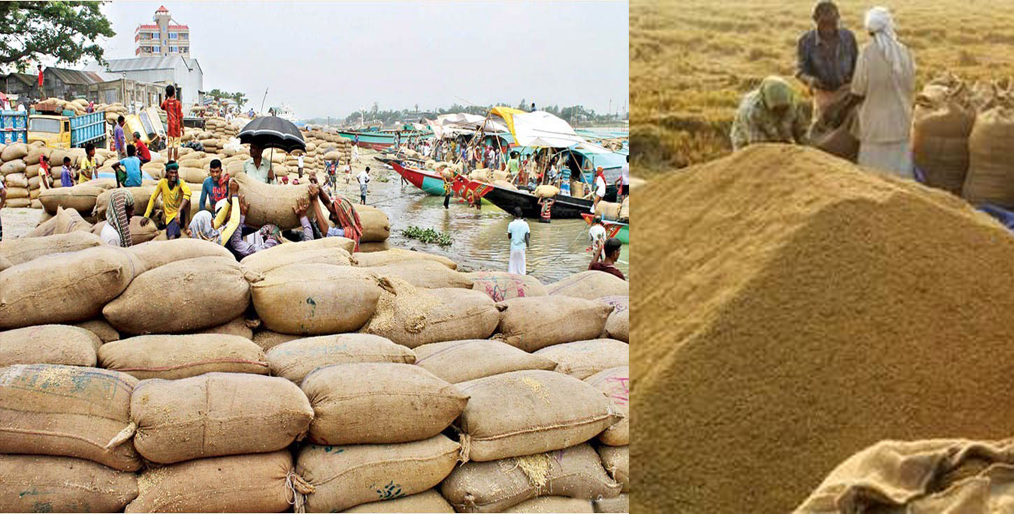
[caption id="attachment_4794" align="aligncenter" width="1014"] File Photo[/caption]
According to the Brac Institute of Governance and Development (BIGD), about 99% of farmers in the last boro season did not get the price fixed by the government for their paddy.
BIGD disclosed the finding in a webinar on Monday (July 6, 2020), after completion of the first phase of a study titled “Effects of Covid-19 on Boro rice farmers: Results from a rapid survey.”
The government fixed Tk. 1,040 per maund of paddy as the price for government procurement this year. Only 1% of farmers who participated in the study got access to the government procurement program.
Farmers earned an average of Tk. 765 per maund, selling their paddy in local markets, as opposed to Tk654 in fiscal year 2018-19.
They made 40% less profit than expected, and the yield was 7% lower than expected due to the Covid-19 pandemic. Each acre of land produced 4 maunds less paddy than in previous years, which amounts to a decrease of 4.8 crore maund in total production, worth about Tk. 3,687 crore.
The production cost increased by 13%, while labour wages rose by 17%.
Among the respondents, 40% of farmers said production had decreased due to labour shortages, while 30% said it had decreased as they could not buy pesticides in time, and 28% said they could not get fertilizer in time.
71% of the farmers said either failure to buy diesel or delays to harvesting due to transport and financial constraints impacted production volume.
The study also found that 42% of farmers took out loans from different formal and traditional sources, 55% took loans from NGOs, 14% from moneylenders, and only 14% had access to bank loans. Large-scale farmers had greater access to bank loans than small-scale farmers.
Dr. Narayan C Das, senior research fellow of BIGD, delivered the keynote speech on the research findings. The webinar was moderated by Imram Matin, executive director of BIGD.
BIGD conducted the study from May 20 to June 3. A total of 2,834 farmers responded to the survey over telephone, and 72 % of the farmers had completed their harvesting when the study was conducted.
Agriculture Secretary Md Nasiruzzaman, and Bangladesh Agricultural University Professor MA Sattar Mandal, countered the findings of the study during the panel discussion.
Md Nasiruzzaman said: “The use of fertilizer, pesticides, seeds and irrigation, was completed before starting the lockdown. Nothing was affected by Covid-19. Labour costs are high in the Boro season every year, so there is no relation between the high labour cost and Covid-19.
“Per hectare Boro production this year is higher than last year,” he said.
The Agriculture secretary also said: “There are over 16 million farmer families in the country. That all the farmer families did not get access to the government procurement process is normal, as the government purchases a small amount of paddy and rice compared to the number of farming families in the country. Find more...
Source: Online/SZK
File Photo[/caption]
According to the Brac Institute of Governance and Development (BIGD), about 99% of farmers in the last boro season did not get the price fixed by the government for their paddy.
BIGD disclosed the finding in a webinar on Monday (July 6, 2020), after completion of the first phase of a study titled “Effects of Covid-19 on Boro rice farmers: Results from a rapid survey.”
The government fixed Tk. 1,040 per maund of paddy as the price for government procurement this year. Only 1% of farmers who participated in the study got access to the government procurement program.
Farmers earned an average of Tk. 765 per maund, selling their paddy in local markets, as opposed to Tk654 in fiscal year 2018-19.
They made 40% less profit than expected, and the yield was 7% lower than expected due to the Covid-19 pandemic. Each acre of land produced 4 maunds less paddy than in previous years, which amounts to a decrease of 4.8 crore maund in total production, worth about Tk. 3,687 crore.
The production cost increased by 13%, while labour wages rose by 17%.
Among the respondents, 40% of farmers said production had decreased due to labour shortages, while 30% said it had decreased as they could not buy pesticides in time, and 28% said they could not get fertilizer in time.
71% of the farmers said either failure to buy diesel or delays to harvesting due to transport and financial constraints impacted production volume.
The study also found that 42% of farmers took out loans from different formal and traditional sources, 55% took loans from NGOs, 14% from moneylenders, and only 14% had access to bank loans. Large-scale farmers had greater access to bank loans than small-scale farmers.
Dr. Narayan C Das, senior research fellow of BIGD, delivered the keynote speech on the research findings. The webinar was moderated by Imram Matin, executive director of BIGD.
BIGD conducted the study from May 20 to June 3. A total of 2,834 farmers responded to the survey over telephone, and 72 % of the farmers had completed their harvesting when the study was conducted.
Agriculture Secretary Md Nasiruzzaman, and Bangladesh Agricultural University Professor MA Sattar Mandal, countered the findings of the study during the panel discussion.
Md Nasiruzzaman said: “The use of fertilizer, pesticides, seeds and irrigation, was completed before starting the lockdown. Nothing was affected by Covid-19. Labour costs are high in the Boro season every year, so there is no relation between the high labour cost and Covid-19.
“Per hectare Boro production this year is higher than last year,” he said.
The Agriculture secretary also said: “There are over 16 million farmer families in the country. That all the farmer families did not get access to the government procurement process is normal, as the government purchases a small amount of paddy and rice compared to the number of farming families in the country. Find more...
Source: Online/SZK
Comment Now